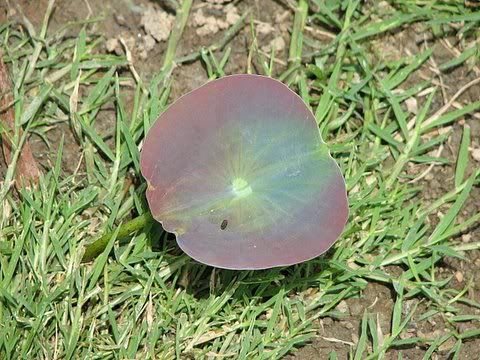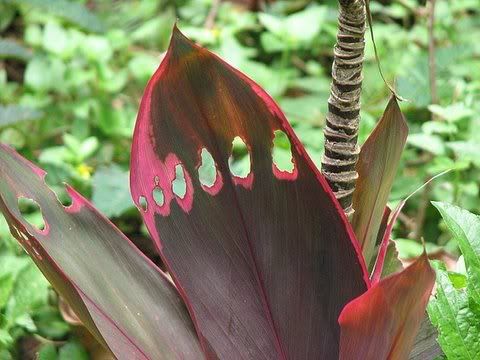The plants of Ragihalli
The plants and trees, too, at Ragihalli and Shivanahalli, were lovely to look at. I took a lot of pictures, and am still trying for the id’s of some of them.
At the kere (or lake..it was, actually, larger than a pond but smaller than a lake, so I don’t really don’t know how to classify it!),we saw a lot of water plants.
I am not sure if this is just a leaf of the water hyacinth, or another plant. But the colours were so amazing, I just had to capture it!
Note the little insect on it…
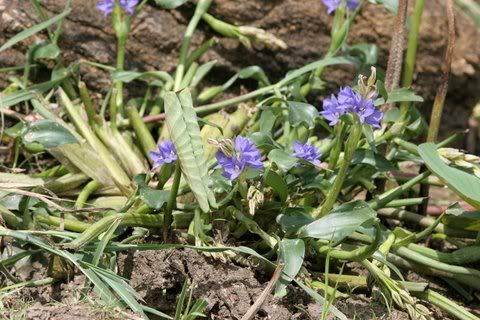 Looks so deceptively pretty; but I equate CROWS, WATER HYACINTH and LANTANA in the same way...they crowd out every other living being they share their space with.
On a more positive note, on the sunshade of one of the village homes, I found this beautiful
SNAKE GOURD flower:
Looks so deceptively pretty; but I equate CROWS, WATER HYACINTH and LANTANA in the same way...they crowd out every other living being they share their space with.
On a more positive note, on the sunshade of one of the village homes, I found this beautiful
SNAKE GOURD flower:
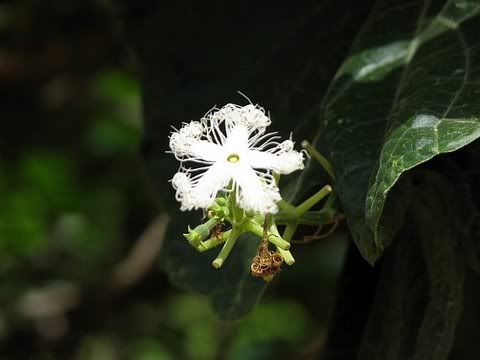 These MUSHROOMS were looking very pretty as we walked over the vegetation:
These MUSHROOMS were looking very pretty as we walked over the vegetation:
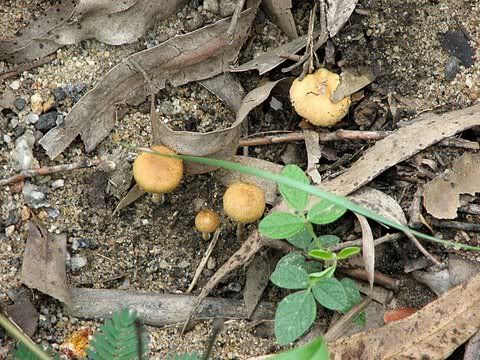 There were plenty of these un id WILDFLOWERS on the rocks:
There were plenty of these un id WILDFLOWERS on the rocks:
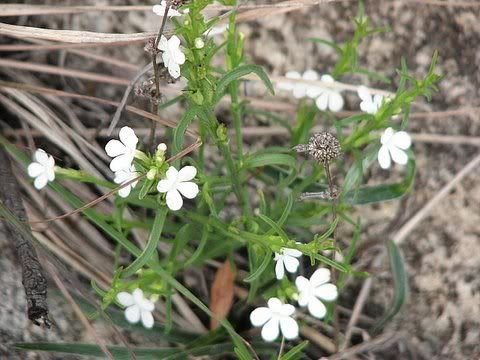 I also loved this carpet of MOSS, and stroking the soft velvet with my hand was better than having my foot slip on its smooth surface!
I also loved this carpet of MOSS, and stroking the soft velvet with my hand was better than having my foot slip on its smooth surface!
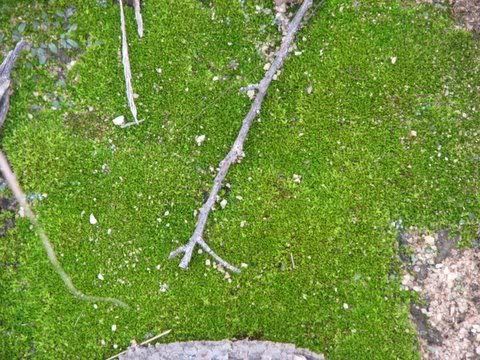 In many places, the Gloriosa superba (the GLORY or the FLAME LILY) was abloom, what striking flowers they are!
In many places, the Gloriosa superba (the GLORY or the FLAME LILY) was abloom, what striking flowers they are!
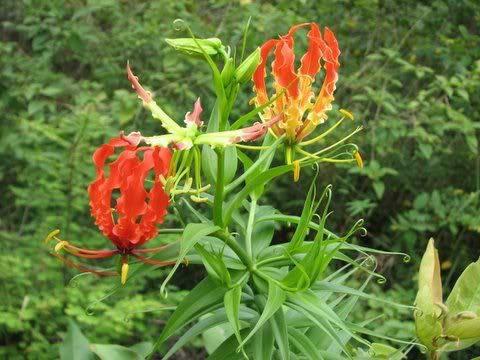 There was this small wildflower which grew directly on the back of the leaflets of the plant!
There was this small wildflower which grew directly on the back of the leaflets of the plant!
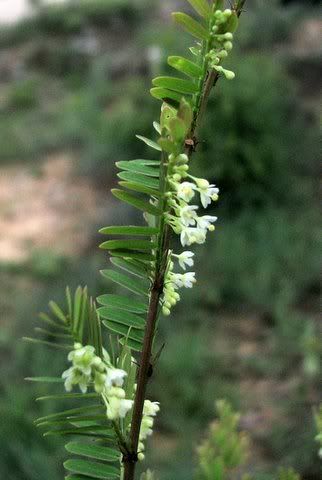 I thought this was some floral development on this leaf, but Karthik told me it is probably a MEALY BUG with its legs showing on either side of the leaf, I wish I had looked more carefully, but I didn't want to disturb anything!
I thought this was some floral development on this leaf, but Karthik told me it is probably a MEALY BUG with its legs showing on either side of the leaf, I wish I had looked more carefully, but I didn't want to disturb anything!
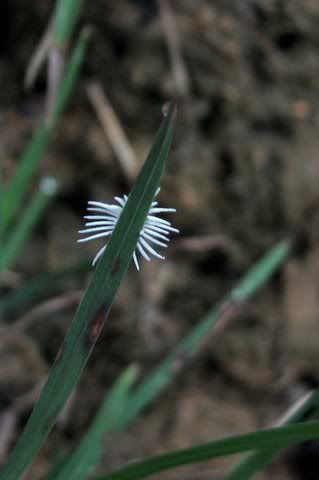 Another plant was covered with these
WOODY FLOWERS, and made a beautiful picture:
Another plant was covered with these
WOODY FLOWERS, and made a beautiful picture:
 Some of the woody plants had these UN ID FRUIT:
Some of the woody plants had these UN ID FRUIT:
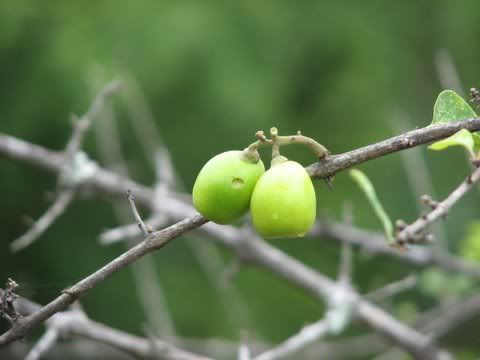 I saw this CLERODENDRUM, with an insect flying near it, for pollination:
I saw this CLERODENDRUM, with an insect flying near it, for pollination:
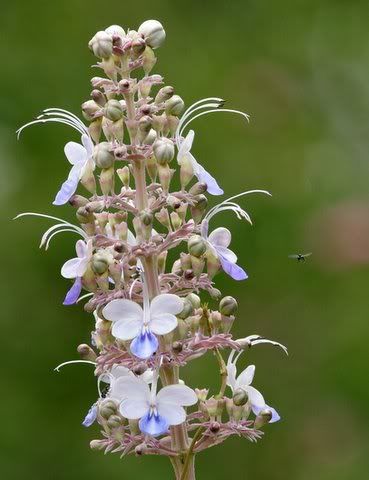 After many decades, I saw the KADAMBA trees in the Ramakrishna Ashram; apparently they are prized for their attar. Here's the beautiful
KADAMBA FLOWER:
After many decades, I saw the KADAMBA trees in the Ramakrishna Ashram; apparently they are prized for their attar. Here's the beautiful
KADAMBA FLOWER:
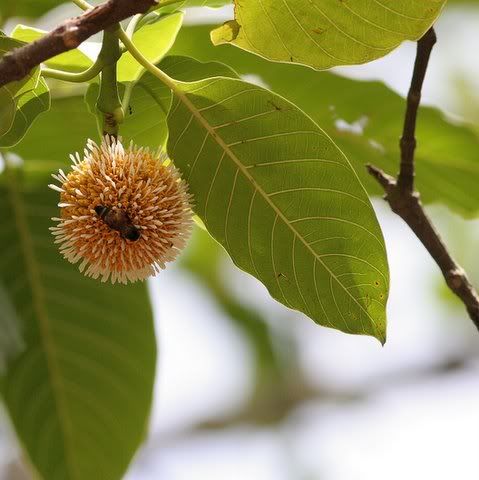 Oh, btw, googling for that tree also brought up this Kadamba as the basic ancient script from which Kannada has evolved
It also brought up this intriguing entry
At the ashram I also saw these
BETEL VINES being grown. These are so much a part of our lives:
Oh, btw, googling for that tree also brought up this Kadamba as the basic ancient script from which Kannada has evolved
It also brought up this intriguing entry
At the ashram I also saw these
BETEL VINES being grown. These are so much a part of our lives:
 I remember crushing the special "KumbhakONam" betel leaves and giving them, in a little honey, to my daughter, to cure her cough and cold.
I remember crushing the special "KumbhakONam" betel leaves and giving them, in a little honey, to my daughter, to cure her cough and cold.
Even with domestic plants, there was something to see and appreciate. I thought these were holes where insects had eaten away the leaves, until I looked at the colouring and realized that they were
Patterns on Crotons:
Sometimes the leaves and stems themselves made a lovely picture:
This post shows why I will never be disappointed or bored when I am on a field trip!

